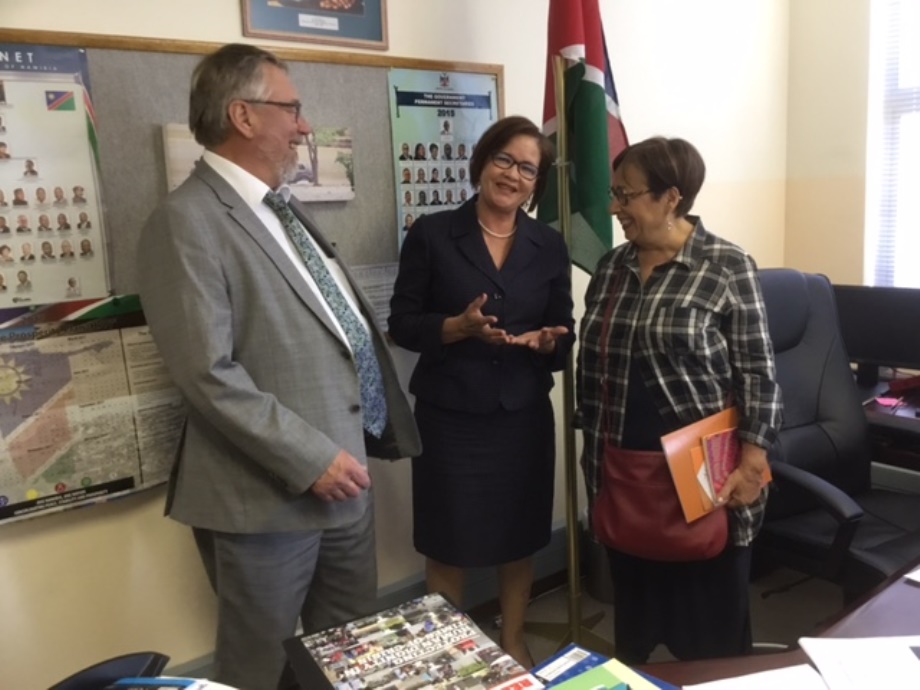EU-SPS co-operation with Namibia
Namibia has been classified as a Higher Middle Income Country (HMIC) since 2009. The real growth of the GDP has been around 4-6% annually since 2010. The Official Development Aid (ODA) has decreased drastically as a consequence of Namibia’s achievement of the HMIC status.
Context
Rapid economic growth has benefitted various population groups rather unequally. The Gini Coefficient that measures income inequality has decreased since independence (1990) but is still one of the highest in the world. The National Household Income and Expenditure Survey (NHIES 2015/16) give a Gini Coefficient of 0.56. The overall poverty level has come down significantly, from 28.8% to 17.4% since the 2009/10.
Namibia has a rather comprehensive set of social protection programmes originating from several historical periods and they have thus been built on differing goals and purposes. There are over 30 programmes managed by seven ministries but coordinating mechanisms have not been in place. This has resulted in a fragmented system.
A great success has been the Basic Social Grant, the so-called Social Pension, for all people over 60 years of age. The social pension covers 98% of population over 60 years old, and has effectively reduced poverty of older people. Many other programmes such as child grants are less adequate and coverage is more uneven.
Focus of the cooperation
The EU-SPS capacity development component was led by the Helsinki Office. It worked in coordinated cooperation with the analytic component led by the OECD in the Paris Office. Capacity development was programmed and funded jointly by the EU-SPS Programme, the German GIZ and UNICEF Namibia since 2017. The GIZ-funded components have supported the development of the Social Protection Policy and Action Plan and the development of a unified social protection registry.
Desktop studies and extensive discussions with the key stakeholders in Namibia have indicated that the main challenge of the social protection sector in Namibia is the fragmentation of the system. Therefore, the planned outcome of the EU-SPS Initiative was to improve institutional, organizational and individual capacities for managing the social protection sector. This way coverage, adequacy, administrative efficiency and sustainability could be improved.
The intervention strategy has been built on the following principles: The Programme is demand-driven, owned and led by Namibian Government, EU-SPS Initiative complemented actions by other development partners and worked step-by-step along with Government processes. The co-operation focused on selected Government priorities that the EU-SPS Initiative was able to support on the basis of its mandates and resources.
Organization of the joint work
With the diplomatic facilitation of UNICEF Namibia and the Embassy of Finland in Namibia an inter-ministerial Social Protection Core Team (SPCT) was established by the Ministry for Poverty Eradication and Social Welfare (MPESW). The SPCT prepared a whole-of-government response to address the challenges of the Namibian social protection system. The SPCT was the focal point through which the development partners involved in the EU-SPS Initiative channeled and coordinated their support. UNICEF Namibia acted as a resident facilitating partner in the SPCT.

Areas of support and results
The areas of EU-SPS Initiative's support were based on the Government of Namibia’s multi-sectoral Blue Print on Wealth Redistribution and Poverty Eradication that was prepared in 2016/17.
Read the 'Blue Print' on the Ministry of Poverty Eradication and Social Welfare website
The EU-SPS Initiative in collaboration with UNICEF Namibia provided financing and expertise in the following priority areas of the Ministry for Poverty Eradication and Social Welfare.
Assessment and evidence building
The following reports were produced through assessment and evidence building:
- Institutional Assessment of Namibia’s Social Protection System: Strengths, weaknesses and reforming options for the governance of the social protection system in Namibia (pdf 1.39 MB)
- Financing social protection in Namibia (oecd.org)
- Universal Social Protection: The Basic Social Grant for all older persons in Namibia
The Institutional Assessment was prepared by the Institute for Social Policy Research (ISPR). The Financial Analysis was prepared in cooperation between the OECD and Klaus Shade of the Economic Association of Namibia (EAN).
Institutional capacity development
- Providing a consultant to prepare the National Social Protection Policy 2019-2024, (Ministry of Poverty Eradication and Social Welfare (2018) (To be published)
- Supporting the work on designing an Integrated Social Protection Register (ongoing) and supporting to designing a Universal Child Grant
- Organizing a TRANSFORM training (report below)
- In the course of the Programme the EU-SPS Initiative with UNICEF Namibia and the Government jointly organized three multi-stakeholder workshops on the strengthening of social protection system in Namibia, and supported participation of Namibian experts in regional events and trainings.
Guidance note
- Whole of Government Approach to Comprehensive Social Policies: The Case of Namibia. Lessons learned and recommendations for development partners (forthcoming)




